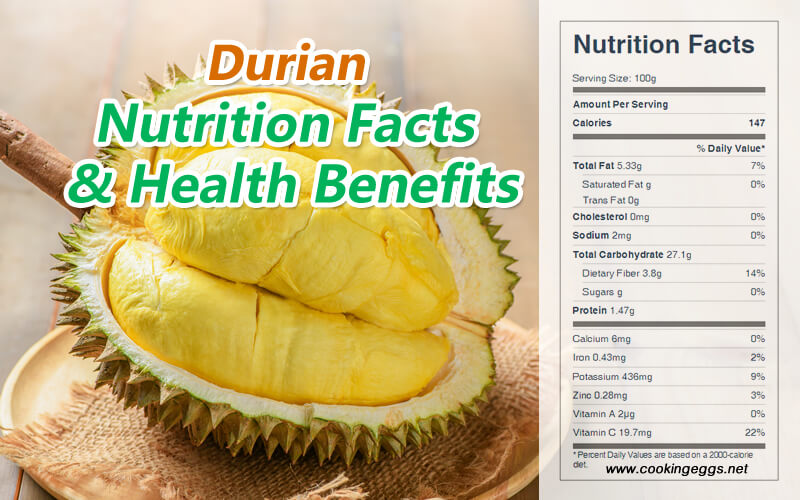Durian Nutrition Facts and Health Benefits
Warning: A non-numeric value encountered in /www/wwwroot/www.cookingeggs.net/wp-content/plugins/nutrition-facts-label/nutrition-facts-label.php on line 384
Warning: A non-numeric value encountered in /www/wwwroot/www.cookingeggs.net/wp-content/plugins/nutrition-facts-label/nutrition-facts-label.php on line 384
The durian is a famous and popular native fruit of Southeast Asia. The ripe durian fruit, owing to its unique taste and aroma, is known as the King of Fruit.
Durian fruits are high in nutrition and bioactive compounds. The fruit pulp is a good source of protein, lipids, ash, fiber, and carbohydrates. Fatty acids contain the methyl esters of myristic acid, linoleic acid, oleic acid, palmitoleic acid, palmitic acid, and stearic acid.
The importance of durian is mostly connected with its composition and antioxidant properties. It is nutritionally rich in essential minerals and vitamins. In addition, it contains bioactive compounds with high antioxidant activity. Therefore, durian is recommended as a nutritional supplement to the normal diet.
Nutritional Value of Durian
Raw durian is composed of 65% water, 27% carbohydrates (including 4% dietary fibre), 5.3% fat, and 1.4% protein.
In a 100 gram reference amount, raw durian provides 147 kcal, 27.1g carbohydrate, 1.47g protein, 5.33g fat, 3.8g dietary fiber, 0.37 mg thiamin(vitamin B1), 0.31 mg vitamin B6, 19.7 mg vitamin C, 0.2 mg copper, 0.32 mg manganese, and 436 mg potassium.

Raw Durian Nutrition Facts Label
Health Benefits of Durian
Durian is rich in thiamin ( 33% of the Daily Value), commonly known as vitamin B1. Adequate intakes of vitamin B1 may reduce the risk of the development of cataract and diabetes complications as well as assist in the management of beriberi, congestive failure, and cancer. A thiamin deficiency can result in a form of dementia called Wernicke syndrome. This pathological hallmark of AD could be reversed by thiamine, suggesting that thiamin could be protective in AD.
Durian is one of the best plant dietary sources of vitamin B6, since a 100 g serving of this fruit provides 0.31 mg, which is 24% of the recommended daily intake for this vitamin. There is evidence to suggest that adequate vitamin B6 intake is important for optimal immune system function, especially in older individuals. Adequate intakes of vitamin B6 play an important role in the prevention of immune dysfunction, CVD, inflammation, dementia, depression, cancer, and kidney stones.
The durian fruit is also a good source of vitamin C (22% of the DV). Vitamin C is an essential nutrient involved in the repair of tissue, the formation of collagen, and the enzymatic production of certain neurotransmitters. It is required for the functioning of several enzymes and is important for immune system function. It also functions as an antioxidant.
Durian is rich in dietary fiber; it is metabolized to yield short-chain fatty acids, which have diverse roles in gastrointestinal health. A diet high in regular fiber consumption is generally associated with supporting health and lowering the risk of several diseases, including heart disease, cardiovascular diseases, colorectal cancer, dementia, and diabetes.
Durian is rich in Omega-3 fatty acids, compared to some other fruits. The fatty acid composition of durian flesh is particularly rich in oleic acid and palmitic acid. It is free from cholesterol and saturated fats. The cholesterol hypothesis implies that reducing the intake of saturated fats and cholesterol while increasing that of polyunsaturated oils is effective in lowering serum cholesterol and thereby reducing coronary heart disease. A study found that diets enriched in oleic acid are beneficial for regulating body weight.